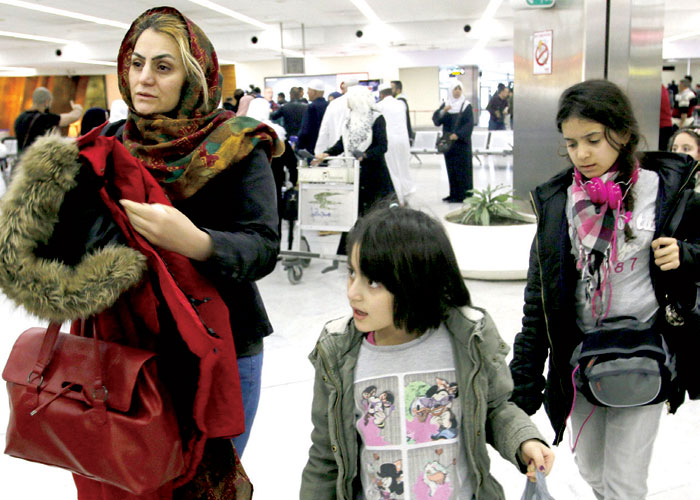London - Finland has been home to Mustafa, a 38-year-old journalist from Iraq’s Anbar province, for the last 11 months.
Egypt had been his initial destination after landing in Turkey after fleeing the conflict in Iraq. Three months into his stay, however, he received an ultimatum: Return to Turkey or face imprisonment.
Egypt’s three-year temporary residency permit, Mustafa, who spoke on condition his surname not be disclosed, explained, “is attainable if you’re a student or a businessman. I’m neither.”
Usama, 30, arrived in Finland last October harbouring similar hopes. He also did not want his surname disclosed. He and Mustafa were interviewed using WhatsApp.
With a trace of anguish in his voice, Usama explained how sectarian killings tore his home of Diyala apart. “Iraq to me is dead,” Usama said. “I came here to act on the desire of building a better future for my four children and destitute wife.”
The hopes of Mustafa and Usama for permanent resettlement were left hanging by a thin thread following revisions to the Finnish immigration law that led to many rejected asylum seekers being ushered onto chartered flights back home. Finnish authorities cited “improved security” in Iraq as the motive behind the mass deportations.
Iraqis to whom return is not an option did not remain silent. They took to the streets of Helsinki and elsewhere, condemning a decision they assert is built on false pretences.
“Where do I go?” asked Mustafa, whose home in Falluja has been demolished.
Usama says he faces a similar predicament. He said he had been wrongly imprisoned in Iraq for 16 months based on allegations made by a secret informant. After his eventual acquittal, a new threat confronted Usama: the Islamic State (ISIS).
“The threat is not perceived,” says Mustafa, “but illogical thinking prevails in the portrayal of Iraq as safe.”
“For the first year after Daesh overran Falluja, I was able to survive, working as a journalist,” Mustafa said, referring to ISIS by its Arabic acronym. “One day I felt a hand clasp my shoulder. A heavy voice followed: ‘Why are you not attending prayers?’ I was scolded by a member of Daesh’s Hisbe al-Dakhilia [special police force] convinced that I was deliberately avoiding prayer and would only settle the matter in court.”
As Baghdad and the northern Iraqi provinces closed their doors to displaced civilians, Mustafa embarked on a perilous journey. After travelling for 16 days through eight countries and a brief stint in a Hungarian prison, he reached Finland.
Not long after settling there, Mustafa detected something offbeat in stories told by other Iraqis. Many claimed that battles against ISIS in Falluja, Anbar, Ramadi and Tikrit had rendered them homeless.
“The majority were able to produce adequate documentation in support of their tales. While there was truth to what they were saying, their dialects exposed their lies,” Mustafa said. He said many of these people were from southern Iraq and were not in danger but had “left voluntarily, exploiting an opportune moment”.
“Many fabricated refugee stories are not scrutinised,” Usama echoed. “Meanwhile, the fate of us, with evidence to substantiate well-founded fears of persecution, is marked by prolonged uncertainty.”
Both men underlined the difficulties in distinguishing the “honest” from the “deceitful”.
“We all heard about the thousands who cancelled their application to return home — either because of false hopes, bad weather or family duties,” Mustafa said, cautioning that “the reality is far more convoluted”.
Further impediments to the men’s hopes to remain in Finland, which had been fairly hospitable for the most part, they say, came after the arrest of several Iraqi men on charges of war crimes.
Iraqi twin brothers were taken into custody in Finland last year for alleged involvement in the June 2014 Camp Speicher massacre in which nearly 1,600 Iraqi Air Force cadets were killed by ISIS. Also, two former Iraqi Shia militiamen were arrested in March in Finland after photographs of them posing with decapitated heads surfaced online.
Out of the 3,679 refugees who have applied for asylum in Finland in 2016, 815 are Iraqi. Finnish magazine YLE reported that 85% of the 32,500 applications for asylum in the country had been approved. However, in June and July, only one-in-six applications was accepted.
Mustafa and Usama, who have been sharing an apartment provided by the Ministry of Economic Affairs with seven other Iraqis in Kemijärvi, said they feel increasingly threatened by accelerated deportations. They want to remain in a country that has been providing them each with a $314 monthly allowance and hope that their families, who are confined to a life of deprivation scattered across refugee camps, can join them.
A glimmer of hope still exists as Iraqi Ambassador to Finland Matheel al-Sabti appealed to Finland to allow Iraqi asylum seekers to stay in the northern European country “at least some time longer”, the Finland Times reported.
Sabti confirmed that “Iraq does not accept enforced and involuntary reparations of Iraqis to Iraq… There are no refugee camps for these people to go to if they have no work or family.”
Source www.thearabweekly.com/?id=6269


 RSS Feed
RSS Feed